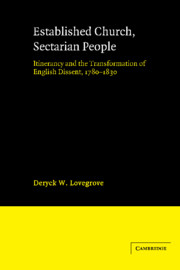 Established Church, Sectarian People
Established Church, Sectarian People Book contents
- Frontmatter
- Contents
- List of figures
- Preface
- Acknowledgements
- List of abbreviations
- 1 The Established Church and English Separatism
- 2 Itinerancy and Dissent
- 3 Preachers and sponsors
- 4 The academic leaven
- 5 Organization and infrastructure
- 6 Support and opposition
- 7 Criticism and legality
- 8 Developments and trends
- Conclusion
- Appendix A Journal of T[homas] Wastfield, June 1797–April 1798
- Appendix B Organizations active in itinerant evangelism
- Appendix C Baptismal statistics
- Notes
- Bibliography
- Index
6 - Support and opposition
Published online by Cambridge University Press: 13 October 2009
- Frontmatter
- Contents
- List of figures
- Preface
- Acknowledgements
- List of abbreviations
- 1 The Established Church and English Separatism
- 2 Itinerancy and Dissent
- 3 Preachers and sponsors
- 4 The academic leaven
- 5 Organization and infrastructure
- 6 Support and opposition
- 7 Criticism and legality
- 8 Developments and trends
- Conclusion
- Appendix A Journal of T[homas] Wastfield, June 1797–April 1798
- Appendix B Organizations active in itinerant evangelism
- Appendix C Baptismal statistics
- Notes
- Bibliography
- Index
Summary
The latter part of the 1790s was not an auspicious time for the birth of a new, popular movement. With political sensitivity strained to its limits by the developments in France, the rapid spread of Dissenting itinerancy was bound to provoke a reaction. Aggressive utterances by leading Establishment figures were accompanied by disturbing rumours of impending legislation designed to restrict the existing limited range of religious freedoms. Yet, as the Methodists had discovered earlier in the century, effective opposition arose most readily at the local level. In the absence of decisive action on the part of national authorities, individuals with local influence found themselves organizing the resistance. Immediate practical measures to check Dissenting expansion were initiated not by government but by local landowners, parsons and magistrates capitalizing on the more aggressive elements within the populace. While this opposition is too important to ignore, there is never any suggestion that it constituted more than a temporary setback to the progress of evangelical Dissent.
Although negative attitudes provide the most interesting subjects for analysis, their presence cannot obscure the favourable response with which people from all sections of society greeted the evangelists. Not only were sizeable audiences ready to gather at short notice, in the open air and at unattractive times of the day, but items of correspondence and itinerants' reports mention groups of villagers who were prepared to accompany the preachers from one preaching station to another.
- Type
- Chapter
- Information
- Established Church, Sectarian PeopleItinerancy and the Transformation of English Dissent, 1780–1830, pp. 105 - 120Publisher: Cambridge University PressPrint publication year: 1988
